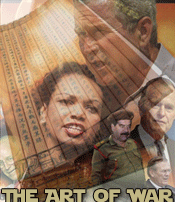 Does Sun Tzu Live in the George W. Bush White House?
Does Sun Tzu Live in the George W. Bush White House?
Study: False statements preceded war
Hundreds of false statements on WMDs, al-Qaida used to justify Iraq war
by Burleigh Sullivan
Just released today, a study by two nonprofit journalism organizations found that President Bush and top administration officials issued hundreds of false statements about the national security threat from Iraq in the two years following the 2001 terrorist attacks. This writer wonders if Sun Tzu, the famous writer of The Art of War and champion of the art of deception to acheive one’s mission, is actually alive and well and living in the George W. Bush White House and is it morally okay to use deception to make and win war.
First, the study concluded that the statements "were part of an orchestrated campaign that effectively galvanized public opinion and, in the process, led the nation to war under decidedly false pretenses." The study was posted Tuesday on the Web site of the Center for Public Integrity, which worked with the Fund for Independence in Journalism.
White House spokesman Scott Stanzel did not comment on the merits of the study Tuesday night but reiterated the administration’s position that the world community viewed Iraq’s leader, Saddam Hussein, as a threat.
|
The Art of War is one of the oldest books on military strategy in the world. Like a work of mathematics or science, much of the work is dedicated to defining its concepts in what has been described as a series of formulas. It is the first and one of the most successful works on strategy and has had a huge influence on Eastern and Western military thinking, business tactics, and beyond. Sun Tzu was the first to recognize the importance of positioning in strategy and that position is affected both by objective conditions in the physical environment and the subjective opinions of competitive actors in that environment. He taught that strategy was not planning in the sense of working through a to-do list, instead it requires quickly responding appropriately to changing conditions. Planning works in a controlled environment, but in a competitive environment, competing plans collide creating situations that no one plans. |
"The actions taken in 2003 were based on the collective judgment of intelligence agencies around the world," Stanzel said.
WMD, al-Qaida links debunked
The study counted 935 false statements in the two-year period. It found that in speeches, briefings, interviews and other venues, Bush and administration officials stated unequivocally on at least 532 occasions that Iraq had weapons of mass destruction or was trying to produce or obtain them or had links to al-Qaida or both.
"It is now beyond dispute that Iraq did not possess any weapons of mass destruction or have meaningful ties to al-Qaida," according to Charles Lewis and Mark Reading-Smith of the Fund for Independence in Journalism staff members, writing an overview of the study. "In short, the Bush administration led the nation to war on the basis of erroneous information that it methodically propagated and that culminated in military action against Iraq on March 19, 2003."
Named in the study along with Bush were top officials of the administration during the period studied: Vice President Dick Cheney, national security adviser Condoleezza Rice, Defense Secretary Donald H. Rumsfeld, Secretary of State Colin Powell, Deputy Defense Secretary Paul Wolfowitz and White House press secretaries Ari Fleischer and Scott McClellan.
Bush led with 259 false statements, 231 about weapons of mass destruction in Iraq and 28 about Iraq’s links to al-Qaida, the study found. That was second only to Powell’s 244 false statements about weapons of mass destruction in Iraq and 10 about Iraq and al-Qaida.
Media ‘validation’
The center said the study was based on a database created with public statements over the two years beginning on Sept. 11, 2001, and information from more than 25 government reports, books, articles, speeches and interviews.
"The cumulative effect of these false statements — amplified by thousands of news stories and broadcasts — was massive, with the media coverage creating an almost impenetrable din for several critical months in the run-up to war," the study concluded.
"Some journalists — indeed, even some entire news organizations — have since acknowledged that their coverage during those prewar months was far too deferential and uncritical. These mea culpas notwithstanding, much of the wall-to-wall media coverage provided additional, ‘independent’ validation of the Bush administration’s false statements about Iraq," it said.
So, is Sun Tzu being channeled by the Bush Administration? Well, I can say that we go after a President that lies about getting a blow job but when a President lies a thousand times to us and the public about making war we look the other way and that says so much more about our values than any words or rah-rah speech can muster.
ATTENTION READERS
We See The World From All Sides and Want YOU To Be Fully InformedIn fact, intentional disinformation is a disgraceful scourge in media today. So to assuage any possible errant incorrect information posted herein, we strongly encourage you to seek corroboration from other non-VT sources before forming an educated opinion.
About VT - Policies & Disclosures - Comment Policy





